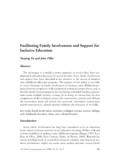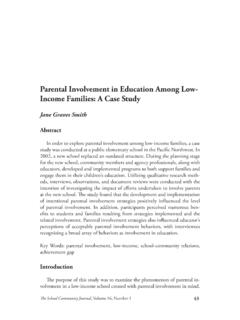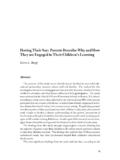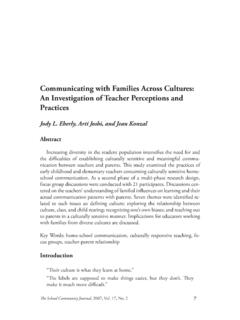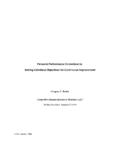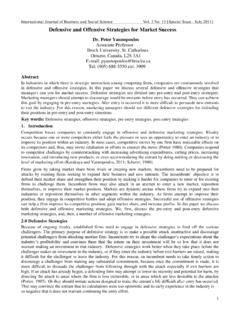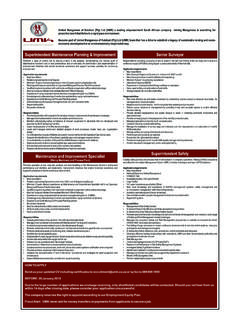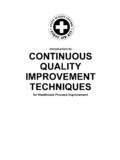Transcription of Coaching for School Improvement: A Guide for …
1 Coaching for School improvement : A Guide for Coaches and Their Supervisorsby Karen LabaCenter on Innovation & ImprovementCenter on Innovation & Improvement121 N. Kickapoo StreetLincoln, IL Tools Training Positive results for students will come from changes in the knowledge, skill, and behavior of their teachers and parents. State policies and programs must provide the opportunity, support, incentive, and expectation for adults close to the lives of children to make wise Center on Innovation & improvement helps regional comprehensive centers in their work with states to provide districts, schools, and families with the opportunity, information, and skills to make wise decisions on behalf of Center on Innovation & improvement is administered by the Academic Development Institute (Lincoln, IL) in partnership with the Temple University Institute for Schools and Society (Philadelphia, PA) and Little Planet Learning (Nashville, TN).
2 A national content center supported by the U. S. Department of Education s Office of Elementary and Secondary #S283B050057 The opinions expressed herein do not necessarily reflect the position of the supporting agencies, and no official endorsement should be inferred. 2011 Academic Development Institute. All rights & design: Pam Sheley Coaching for School improvement : A Guide for Coaches and Their SupervisorsKaren LabaTABLE OF CONTENTSP urpose of the Guide ..3 SECTION 1: What is a School improvement Coach? ..5 What Does a School improvement Coach Do? .. Work ..11 Establish the School improvement Team ..11 improvement Work ..12 improvement Stage 1: Assess Current Status ..12 improvement Stage 2: Develop a Plan for Stage 3: Implement the Plan ..16 improvement Stage 4: Monitor Implementation of the Plan ..17 improvement Stage 5: Monitor the Impact.
3 Stage 6: Review New Data .. Stage 7: Revise and Refine the Plan ..19 SECTION 2: Coaching with Indicators ..21 What are Indicators? ..23 Using Indicators Across the School improvement Cycle .. Formative Feedback ..25 Coaching with Indistar Indicators ..26 SECTION 3: Selecting and Supporting School improvement Coaches ..41 Selecting School improvement Coaches .. School improvement Coaches .. School improvement Coaches .. 4: Monitoring Coaching ..55 Monitoring Implementation .. Steps .. the Author .. , References, and Other Resources ..61 Appendix A: Sample Wise Ways ..63 Appendix B: Feedback Using Bloom s Taxonomy .. C: Selected Coaching Comments ..66 Appendix D: Login Access Descriptions for Indistar ..69 Purpose3 Purpose of the Guide An outside School coach, properly prepared and sensitive to individual and whole- School concerns, can provide a balance of pressure and support to initiate and sustain meaningful School improvement (Kostin & Haeger, 2006).
4 The drive for rapid and continuous School improve-ment places demands on School personnel that require support strategies to ensure their success. Using a School improvement coach is one of these strategies. The School improvement coach, external to the day-to-day responsibilities expected of School leaders and teachers, provides objective and expert guidance to carry out the process of School change. A School improvement coach has similar constraints and opportunities as an athletic coach. Just as Vince Lombardi was not expected to be on the field toss-ing the football and tackling the quarterback, a School improvement coach will not be found teaching fractions or planning the next parent meeting. Instead, a School improvement coach serves as the Guide on the side to the School s improvement team, responsible for building the team s capacity to engage in a long-term improvement process that is challenging, exhausting, and ultimately, professionally rewarding.
5 This Guide offers tools, tips, and strategies the pressures and supports mentioned in the Kostin and Haeger quote above for coaches working with School improvement teams. Ideas in the Guide can be used to inform the training and supervision provided by state agencies, districts, or other organizations responsible for recruiting, hiring, and assigning coaches to work with School teams. In addition to general guidance for School improvement coaches, the Guide offers examples and recommendations for coaches working with teams who are using the online Indistar tool created by the Center on Innovation & improvement (CII) to structure their work. Coaching conducted at a distance presents particular challenges and opportunities; this Guide provides exercises and examples to prepare the coach Coaches who can outline plays on a black board are a dime a dozen.
6 The ones who win get inside their players and motivate. Vince Lombardito meet those challenges and seize the opportunities available through Indistar . For information on Indis-tar , visit Throughout the materials that follow, reference will be made to the School improvement process. While the ac-tual process School teams undertake to plan and carry out strategies leading to the improvement of student achievement varies widely across schools and districts, most will follow this general sequence: Assess current status within a framework of evidence-based practices Plan to build on strengths and address gaps Implement the plan Monitor the impact of the strategies, track prog-ress toward goals Revise the plan in light of current informationMention of the School improvement process in this Guide should be broadly understood to refer to this cycle of assess plan implement monitor revise throughout an organization s lifetime.
7 The Guide is orga-nized by the stages of the cycle, focusing on the coach s changing role and responsibilities as the team moves through the improvement process. In Section 2, coaches using the Indistar online tool will find recommendations to help them address the particular challenges of blending face-to-face and on-line Coaching . Section 2 includes best practices for using the research-based indicators which form the structure of Indistar , criteria for assessing the team s judgment of its level of implementation, and opportunities to practice providing formative feedback to School teams. Those responsible for recruiting, hiring, training, and supervising School improvement coaches will find exer-cises and examples of lessons learned from early adopt-ers of the Indistar online process in Section 3. Monitor Implement Plan Assess Revise Coaching for School of the approaches used by sponsors to monitor coaches for School improvement teams are presented in Section 4.
8 As an emerging practice, coach-ing for School improvement inspires more questions than answers about its impact on School practices and, ultimately, on student achievement. Instead of a well-developed research base for Coaching , Section 4 offers a set of questions to Guide the collection of evidence about the use of a Coaching approach, that, when ex-amined, can inform future decisions about the Coaching practices that promote the most meaningful impact on schools and their students. SECTION 1: What is a School improvement Coach? 6 Coaching for School ImprovementWhat Is a School improvement Coach7 The term coach is applied across many life activities football coach, drama coach, execu-tive management coach. In education circles, we see references to an instructional coach, leadership coach, literacy/reading coach, cognitive coach, assessment and data coach, and School improvement coach, just to name a few.
9 As we use the term in each setting, we implicitly assign a set of expectations for who the coach is, who is being coached, what the coach might do, and, for certain audiences, how best to recruit, select, and evaluate the work of the coach. In the current context of School accountability, we are using the term coach to mean a highly skilled individual who is charged with providing essential pressures and supports to a School improvement team to attain the ultimate goal of raising student achievement. In North Dakota and Idaho, they refer to the individuals hired to support School improvement teams as capacity build-ers, emphasizing the desired result of good Coaching namely growth in the ability of the School improvement team and team leader to Guide and manage the sys-temic changes that will lead to the desired educational outcomes for students.
10 Who is a School improvement coach? Coaches are often contracted by state agencies, districts, or affili-ated service centers, ideally in consultation with the School or district receiving support services. In many cases, they are experienced educators or education consultants, often external to the lines of authority and supervision within the School or local education agency. The array of competencies required of individu-als contracted to support School improvement teams fall across at least three domains: technical/knowledge skills, interpersonal skills, and consulting/facilitation skills (Block, 1999). One critical base of knowledge for the School improvement coach is familiarity with the local and state policy environments and with commu-nity needs and interests. Political and cultural context knowledge complements the coach s broad expertise in effective educational practices and strategic planning approaches to lead to realistic change efforts.

